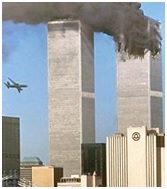|
 |
|
 |
|
|
||
9/11 - Leadership and Strategy
9/11 (2001)
Famous for... The hijacking of four American planes on September 11 2001 by the
Islamic extremist group, al-Qaeda, led by Osama bin Laden -
2,978 from over 90 countries were killed.
9/11’s key moments
8.46 am Flight 11 from Boston crashes into the North Tower of the World Trade Centre, New York.
9.03 am Flight 175 from Boston crashes into the South Tower.
9.37 am Flight 77 from Washington crashes into the Pentagon.
10.03 am Flight 93 from Newark, New Jersey, crashes in an open field in Shanksville, Pennsylvania.
Pre-9/11 key events 1979 Iran overthrows the Shah (the king, pictured right) and becomes an Islamic militant state. Russia (then the Soviet Union) invades Afghanistan.
1989 Al-Qaeda defeats the Russians in Afghanistan after Russia’s invasion.
1991 The Gulf War after Iraq’s Saddam Hussein (pictured right) invades Kuwait. He is defeated by the West's forces:
1993 Islamic extremists bomb the underground garage of the World Trade Centre, killing six people.
1998 Bombing of the American embassies in Kenya and Tanzania, killing 224 people (including 12 Americans).
2000 Bombing of the American warship, Cole , near Aden, Yemen, killing 17 sailors.
Key people in 9/11
Osama bin Laden Al-Qaeda leader from Saudi Arabia killed in his Pakistan home by an American commando raid in 2011. Khalid Sheikh Mohammed Pakistani organizer of 9/11, captured in Pakistan in 2003 (pictured right soon after his arrest) .
19 suicide bombers (in the four hijacked planes). The rescuers (pictured right) New York firefighters, police and other rescuers.
American president from January 20 2001.
Rudy Giuliani New York mayor (pictured right two months after 9/11), praised for his leadership of the rescue effort.
Why did it happen? 1. Al-Qaeda Its leader, Osama bin Laden (pictured right):
After 9/11 the Taliban was overthrown by the Americans and British at the start of the war in Afghanistan in October 2001. - Bin Laden was killed by the Americans in 2011.
2. Islam Al-Qaeda has seen its fight against the Russians and then the Americans as part of an Islamic holy war (or jihad). In 1998 bin Laden issued a religious order (or fatwa), telling Muslims it was their duty to kill all Americans and their allies.
3. The Middle East Arabs have been angry since in 1948:
Israeli victories annoyed them even more – the:
These wars gave Israel control of:
Al-Qaeda wants to:
America:
Results of 9/11 1. Ground Zero and human tragedy The bombings flattened the World Trade Centre and its empty site was called Ground Zero. 2,978 were killed by 9/11 including 343 firefighters. Survivors were covered in dust (pictured right).
2. War on terror 9/11 shocked America, leading to:
The war on terror resulted in the:
a) Afghanistan war (overthrowing the pro-al-Qaeda Taliban government in October 2001)
b) Iraq war (began by America and Britain in 2003) This was particularly controversial because:
3. Enormous expenditure In 2011 the New York Times estimated the cost to America of 9/11 (including extra security and the Iraq and Afghanistan wars) at $3.3 trillion. This has led to problems in:
a) education War has diverted money away from educational programmes in Islamic countries to encourage people to turn away from extremism.
b) Arab relations War alienated many Arabs and some Western countries
c) American defence The expense of war has weakened America's potential military response to an extremist takeover of vital Islamic states like:
4. More bombings Bombings by Islamic extremists happen quite regularly, killing and wounding hundreds of people – for example, in:
5. Life changing experiences 9/11 forced its survivors (including the investment banker, Ari Schonbrun ,pictured right), to re-examine their priorities, particularly valuing people instead of work.
Key quotes on terrorism The City of New York and the United States of America is much stronger than any group of barbaric terrorists, - Rudy Giuliani, Mayor of New York (pictured right just after 9/11), on the day of the attack.
Yes, I’m a terrorist, and I’m proud of it. - Ramzi Yousef (pictured right), Pakistani leader of the 1993 World Trade Centre bombing.
It is not a battle for global supremacy. It is a battle for hearts and minds. - Jason Burke (on stopping Islamic terrorism in his 2003 book, Al-Qaeda).
I didn’t capture his death. I captured part of his life. - Richard Drew (talking about his picture of a man falling from the World Trade Centre on 9/11). The picture was immediately withdrawn for being too horrific.
Key quote on ethics We all have within us the power to say ‘No – I will not retaliate’, or ‘I will not seek revenge'. - Gill Hicks (who lost both her legs and nearly died in the London bombing) - pictured right.
Key quotes about Osama bin Laden O Lord, shatter their gathering, divide them among themselves, shake the earth under their feet and give us control over them. - Osama bin Laden (declaring a holy war, or jihad, against America in 1996).
We will find you and we will bring you to justice. - President George W. Bush in 2006 (talking about Osama bin Laden - on May 1st 2011, announcing his death, President Barack Obama says “Justice has been done”).
Key quote on work Before 9/11 my whole world was consumed by Wall Street. I still work hard, but work is no longer my first, second and third priority., - Ari Schonbrun, 9/11 survivor.
Best book Sid Jacobson and Ernie Colon, 9/11 (2006) – a comic strip account of the terrible day. |
|
|
||
|
|
||
| Copyright © wisdomtowin.com 2025 All Rights Reserved | ||
|















